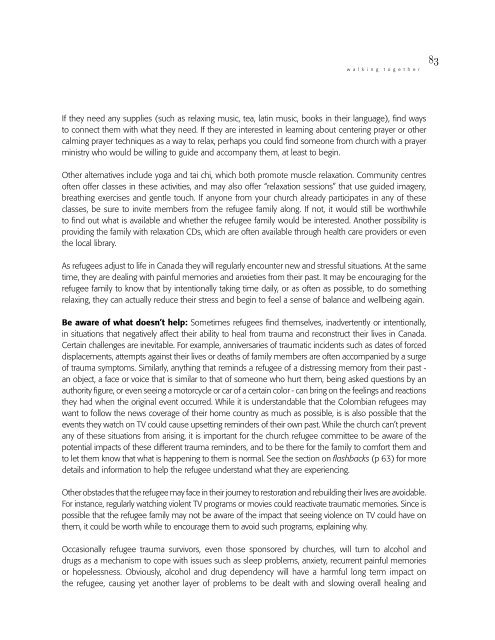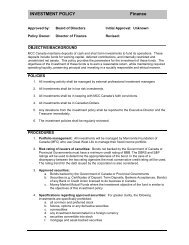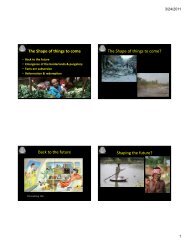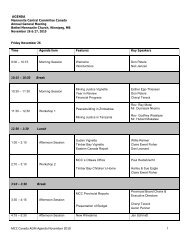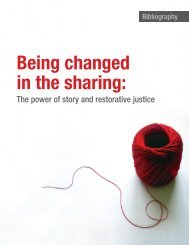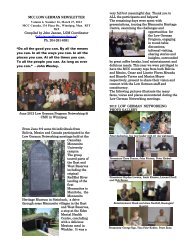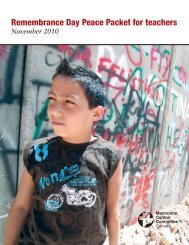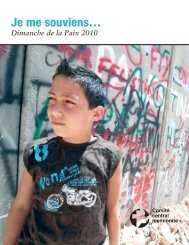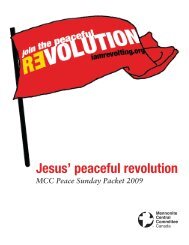Walking together: Healing and hope for Colombian refugees
Walking together: Healing and hope for Colombian refugees
Walking together: Healing and hope for Colombian refugees
You also want an ePaper? Increase the reach of your titles
YUMPU automatically turns print PDFs into web optimized ePapers that Google loves.
w a l k i n g<br />
t o g e t h e r<br />
83<br />
If they need any supplies (such as relaxing music, tea, latin music, books in their language), find ways<br />
to connect them with what they need. If they are interested in learning about centering prayer or other<br />
calming prayer techniques as a way to relax, perhaps you could find someone from church with a prayer<br />
ministry who would be willing to guide <strong>and</strong> accompany them, at least to begin.<br />
Other alternatives include yoga <strong>and</strong> tai chi, which both promote muscle relaxation. Community centres<br />
often offer classes in these activities, <strong>and</strong> may also offer “relaxation sessions” that use guided imagery,<br />
breathing exercises <strong>and</strong> gentle touch. If anyone from your church already participates in any of these<br />
classes, be sure to invite members from the refugee family along. If not, it would still be worthwhile<br />
to find out what is available <strong>and</strong> whether the refugee family would be interested. Another possibility is<br />
providing the family with relaxation CDs, which are often available through health care providers or even<br />
the local library.<br />
As <strong>refugees</strong> adjust to life in Canada they will regularly encounter new <strong>and</strong> stressful situations. At the same<br />
time, they are dealing with painful memories <strong>and</strong> anxieties from their past. It may be encouraging <strong>for</strong> the<br />
refugee family to know that by intentionally taking time daily, or as often as possible, to do something<br />
relaxing, they can actually reduce their stress <strong>and</strong> begin to feel a sense of balance <strong>and</strong> wellbeing again.<br />
Be aware of what doesn’t help: Sometimes <strong>refugees</strong> find themselves, inadvertently or intentionally,<br />
in situations that negatively affect their ability to heal from trauma <strong>and</strong> reconstruct their lives in Canada.<br />
Certain challenges are inevitable. For example, anniversaries of traumatic incidents such as dates of <strong>for</strong>ced<br />
displacements, attempts against their lives or deaths of family members are often accompanied by a surge<br />
of trauma symptoms. Similarly, anything that reminds a refugee of a distressing memory from their past -<br />
an object, a face or voice that is similar to that of someone who hurt them, being asked questions by an<br />
authority figure, or even seeing a motorcycle or car of a certain color - can bring on the feelings <strong>and</strong> reactions<br />
they had when the original event occurred. While it is underst<strong>and</strong>able that the <strong>Colombian</strong> <strong>refugees</strong> may<br />
want to follow the news coverage of their home country as much as possible, is is also possible that the<br />
events they watch on TV could cause upsetting reminders of their own past. While the church can’t prevent<br />
any of these situations from arising, it is important <strong>for</strong> the church refugee committee to be aware of the<br />
potential impacts of these different trauma reminders, <strong>and</strong> to be there <strong>for</strong> the family to com<strong>for</strong>t them <strong>and</strong><br />
to let them know that what is happening to them is normal. See the section on flashbacks (p 63) <strong>for</strong> more<br />
details <strong>and</strong> in<strong>for</strong>mation to help the refugee underst<strong>and</strong> what they are experiencing.<br />
Other obstacles that the refugee may face in their journey to restoration <strong>and</strong> rebuilding their lives are avoidable.<br />
For instance, regularly watching violent TV programs or movies could reactivate traumatic memories. Since is<br />
possible that the refugee family may not be aware of the impact that seeing violence on TV could have on<br />
them, it could be worth while to encourage them to avoid such programs, explaining why.<br />
Occasionally refugee trauma survivors, even those sponsored by churches, will turn to alcohol <strong>and</strong><br />
drugs as a mechanism to cope with issues such as sleep problems, anxiety, recurrent painful memories<br />
or <strong>hope</strong>lessness. Obviously, alcohol <strong>and</strong> drug dependency will have a harmful long term impact on<br />
the refugee, causing yet another layer of problems to be dealt with <strong>and</strong> slowing overall healing <strong>and</strong>


